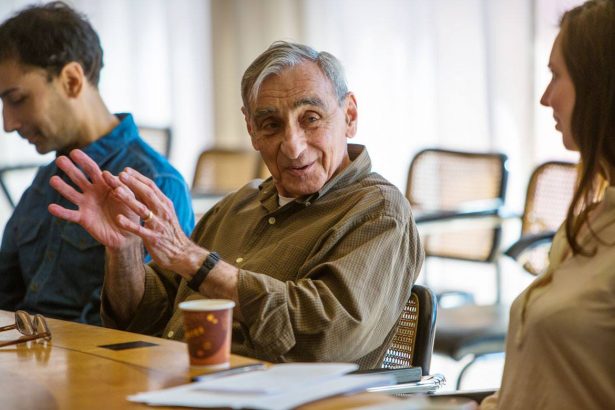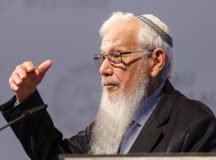Michael Walzer is one of America’s foremost political thinkers. To mark Israel’s 70th birthday he urges the embrace of ‘a more engaging diasporism,’ which acknowledges the value of a Jewish and democratic state but insists also on the value of citizenship in non-Jewish democratic states. ‘This is a politics that challenges the old Zionist goal of the negation of the galut’ he notes, ‘and reminds Jews in Israel and around the world of the ancient and productive dualism of Babylonia and Palestine’.
Polling data about the attitudes of younger American Jews toward Israel show an ongoing decline in engagement. It’s not a question of overt hostility, though the sharp rightward turn of Israeli politics certainly produces hostility among many young Jews and contributes to the alienation. American Jews persist in our liberalism (and some of us in our leftism) and find it hard to explain, let alone support, the policies of the Netanyahu government. We are very much like other liberal Americans; the sharp drop in support for Israel among Democratic voters is alarming.
But for many Jews in the US, the prevailing attitude toward Israel is more like withdrawal or even indifference than political opposition. Assimilation and intermarriage are probably important explanatory factors, but the truth is that even among Jewishly-engaged young people, there is less engagement with Israel, less willingness to follow the news about Israeli politics, less commitment to the political wars. A core of pro-Israel activists survives, and I will write about them below, but the Jews of my generation have obviously not transmitted our Zionist passion to the next generation or the one after that.
Still, disengagement isn’t the whole story. I want to consider here two relatively new forms of political and intellectual activism. The first is the politics surrounding the Boycott, Divestment and Sanctions (BDS) movement – the Jews supporting it and the Jews (with whom I am aligned) opposing it. The second is the revival of ‘diasporism’ – not quite the autonomist programme of Shimon Dubnow but something like his evaluation of Jewish life outside the homeland.
The BDS movement in the US is primarily a university and student movement. It has some reach into mainline Protestantism, but virtually none into the labour movement (where British BDSers have shown considerable strength). The politics of BDS plays out on campuses and in the professional associations. The battles are pretty fierce, and there are two kinds of warriors on each side. Among Jewish supporters of BDS, the ideological leaders are people who are strongly opposed to Jewish sovereignty and therefore to the existence of a state. They believe that the Jewish nation is best served by a diasporic existence (see below), or they believe that there is no such thing as a Jewish nation: the Jews are better understood as a community of faith. But many of their followers share neither of these beliefs; they simply oppose the occupation and think that all other forms of opposition have failed; boycott is, for many of them, a last resort. (In my opinion, they get to ‘lastness’ too fast.)
The opponents of BDS also divide into two groups, best described as Right and Left. But the first thing to note is that there are a lot of us, and we have won some important battles – in the big professional associations, for example. The first group follows the Israeli government’s line, is funded by right-wing American Jews, and is, in my opinion, far less effective than those of us who oppose the occupation and the settlement movement and at the same time fight against the boycotters. The campaign for academic boycotts by anthropologists, historians, political scientists, and English professors is best opposed by liberals and leftists on the different faculties who believe in, and have a long history of defending, academic freedom and civil rights. Right-wing activists are unlikely to succeed in these battles – and even less likely to succeed in the farther Left faculties, in Women’s Studies, for example.
The campus battles, which often take the form of university-wide referenda, also involve faculty members, but the ground troops are students, and I have been heartened by their numbers and their commitment. They may not be the largest group of Jewish students, but they are more than a remnant. Many of them are also active in ‘progressive’ Jewish organisations like J-Street that work in the US on Israeli issues.
The BDS battles are political and ideological, but they don’t have much intellectual depth. Alongside them there is a lively controversy between defenders of the diaspora and old-fashioned Zionists, which recapitulates the controversies of the late nineteenth and early twentieth centuries – between Dubnow and Ahad Ha-am, for example, or Hermann Cohen and Martin Buber. It is a little strange that 70 years after the victory of the Zionists and the founding of the state, these old arguments should be revived. One would have thought that the Holocaust settled the issue and confirmed for all time the necessity of sovereignty and statehood. But the last survivors of the Holocaust are dying; that part of our history is remembered in museums; and American Jewry, in the eyes of American Jews, is a diasporic success story. It can’t happen here.
I don’t find the diasporists who oppose the existence of a Jewish state particularly interesting. Some of them claim to believe that the Jews are too good for statehood or that Jewish values can’t co-exist with the brutality necessary to sustain a state. But that’s clearly a misreading both of the Jews and of Jewish values: survival in the diaspora has not been the work of angels. If our values make us critics, as they should, we would have to criticise not only Israeli but also diasporic Jews.
But there is a more engaging diasporism, which acknowledges the value of a Jewish and democratic state but insists also on the value of citizenship in non-Jewish democratic states. This is a politics that challenges the old Zionist goal of the ‘negation of the galut’ and reminds Jews in Israel and around the world of the ancient and productive dualism of Babylonia and Palestine. The questions that follow from this politics are worth pondering and playing with – I don’t think that they can be confidently answered after only 70 years of statehood. ‘It’s too soon to tell,’ as Chou En-lai is to have said when asked about the outcome of the French revolution.
These are the questions: Where is an authentic Jewish life most possible – in the diaspora where the Judaism we know was created or in the Land of Israel where the Temple stood and the priests ruled? Is it a cultural boost to be a numerical majority? Will the Talmud of the Exile once again outshine the Talmud of the Homeland – or will that ancient order be reversed? Will political sovereignty and territorial rootedness produce a glorious efflorescence of Jewish culture? Or, again, will that efflorescence be peculiarly Israeli, with little connection to Jewish tradition and little resonance in the Jewish diaspora?
Though I am an old Zionist, I wouldn’t take bets on the answers to these questions. But they also don’t worry me. An intellectual/cultural competition between the Jews of Israel and the Jews of the diaspora can only be a good thing for both.






































